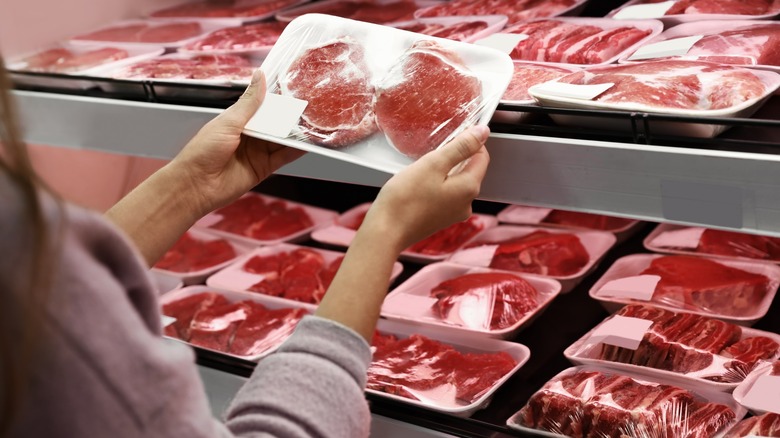You Had A Long Ride Home From The Grocery Store. Is Your Meat Still Good?
If there is one cardinal rule for perishable foods, it's that they must be kept refrigerated or frozen. The most obvious food that falls under this category is meat, which can quickly grow bacteria if not in a temperature-controlled environment. However, sometimes you find yourself en route from the grocery store only to end up in a traffic jam — or you realize you have to run one more errand before heading home. But what happens when food stays out for longer than expected in your trunk? If it's been fewer than two hours, then you should be fine, but don't ever keep meat in the car past that time window, as the U.S. Department of Agriculture explains.
There is one exception here: a hot summer day. Depending on where you store the meat, it could be subject to these high temperatures (if you keep your groceries in the trunk, for example, they won't always get the same air conditioning that the passenger portion of the vehicle does). So, if the outside temperature is above 90 degrees Fahrenheit, never leave the meat in your trunk for more than an hour. If you can't fit within this one-hour time constraint, put the meat up in the front half of the car, to ensure it's in the most air-conditioned part of the vehicle.
You should never keep meat out for more than two hours
Traveling home from the grocery store is hardly a two-hour adventure for most people, so even with a few distractions, it's unlikely that your meat will remain in the car for so long that it will spoil. With that said, if that two-hour mark comes and goes, it's best to throw the meat away. Surpassing that two-hour time window enables harmful bacteria, such as salmonella and E. coli, to grow to dangerous levels, reports the USDA. In this case, eating that meat could lead to food poisoning. Frozen meat is no exception because the outer layer of that meat could thaw quickly, allowing bacteria to grow even when the center of it is still frozen.
While you might think that bacteria will die once the meat is cooked, it's not that simple. Certain bacteria can form heat-resistant toxins while the meat sits out, meaning even heating the meat thoroughly to 165 degrees Fahrenheit won't make it safe to eat, according to the Washington State Department of Health.
How to prevent meat from spoiling during your grocery trip
There are a few tricks to keeping your meat as cool as possible after a grocery store visit. Start by making the meat counter your last stop on the grocery run. This way, that meat is refrigerated almost up until you reach the register, extending that time window as much as possible. You can also keep an insulated cooler in your car, and grab a bag of ice to put in it when you head out of the store, in case delays arise. Placing the meat in the iced cooler will extend its shelf life.
Finally, if you're worried more about the outside temperature and your car happens to have a remote start option, you can keep the car running while you do other errands. In almost all cases, the car stays locked and cannot be driven without the key present. It's a surprising trick to make sure your interior car temperature doesn't get over 90 degrees while you're running from store to store.
And finally, when in doubt, throw it out. If that return trip took much longer than expected, and you can't be certain your meat is safe to use, it's best to toss it. While wasting money is never fun, neither is food poisoning.


